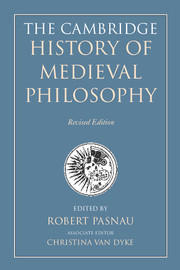Book contents
- Frontmatter
- Contents of Volume 1
- Preface
- List of contributors
- Frontmatter
- Contents of Volume 2
- Introduction
- I Fundamentals
- II Logic and language
- III Natural philosophy
- IV Soul and knowledge
- 21 Soul and body
- 22 The soul’s faculties
- 23 The nature of intellect
- 24 Perception
- 25 Mental representation
- 26 Science and certainty
- 27 Divine illumination
- 28 Skepticism
- V Will and desire
- VI Ethics
- VII Political philosophy
- VIII Metaphysics
- IX Theology
- Appendices
- Bibliography of primary sources
- Bibliography of secondary sources
- Index nominum
- Index rerum
- References
24 - Perception
from IV - Soul and knowledge
Published online by Cambridge University Press: 05 August 2014
- Frontmatter
- Contents of Volume 1
- Preface
- List of contributors
- Frontmatter
- Contents of Volume 2
- Introduction
- I Fundamentals
- II Logic and language
- III Natural philosophy
- IV Soul and knowledge
- 21 Soul and body
- 22 The soul’s faculties
- 23 The nature of intellect
- 24 Perception
- 25 Mental representation
- 26 Science and certainty
- 27 Divine illumination
- 28 Skepticism
- V Will and desire
- VI Ethics
- VII Political philosophy
- VIII Metaphysics
- IX Theology
- Appendices
- Bibliography of primary sources
- Bibliography of secondary sources
- Index nominum
- Index rerum
- References
Summary
The psychological ruminations of Plato and Aristotle gave rise to two interpretative streams that together shaped the course of later medieval theories of perception. The most important of these was the Arabic tradition, which profoundly influenced scholastic thought. Less significant, but still influential, were early Latin accounts of perception. Out of this legacy, scholastic Latin authors developed rich and varied accounts of the physiological and psychological mechanisms of perception.
THE GRECO-LATIN INTERPRETIVE STREAM
Early Latin accounts of classical Greek theories of perception were channeled through such encyclopedic thinkers as Pliny, Macrobius, and Martianus Capella, as well as Augustine and Boethius. Perhaps the most important among these channeling agents was Calcidius, whose fourth-century Latin translation of the first half of Plato’s Timaeus – complete with commentary – proved enormously influential on the study of natural philosophy from the late Carolingian period to at least the mid-twelfth century.
Hugh of St. Victor’s Didascalicon offers a good example of how this interpretive stream had developed by the early twelfth century to combine elements from Plato’s account of perception with second-hand knowledge of Aristotle’s theory. Hugh follows Aristotle’s threefold division of the soul according to its fundamental capacities, beginning with nutrition, passing through sensation, and culminating with reason in humankind (I.3). The link between sense and reason, Hugh explains, is the imagination, which “is sensuous memory made up of the traces of corporeal objects inhering in the mind” (II.5, tr. Taylor, p. 66). Sensation, for its part, “is what the soul undergoes in the body as a result of qualities that come to it from without” (II.5, p. 67).
- Type
- Chapter
- Information
- The Cambridge History of Medieval Philosophy , pp. 334 - 345Publisher: Cambridge University PressPrint publication year: 2014



